Cruel wishes, and cruel actions
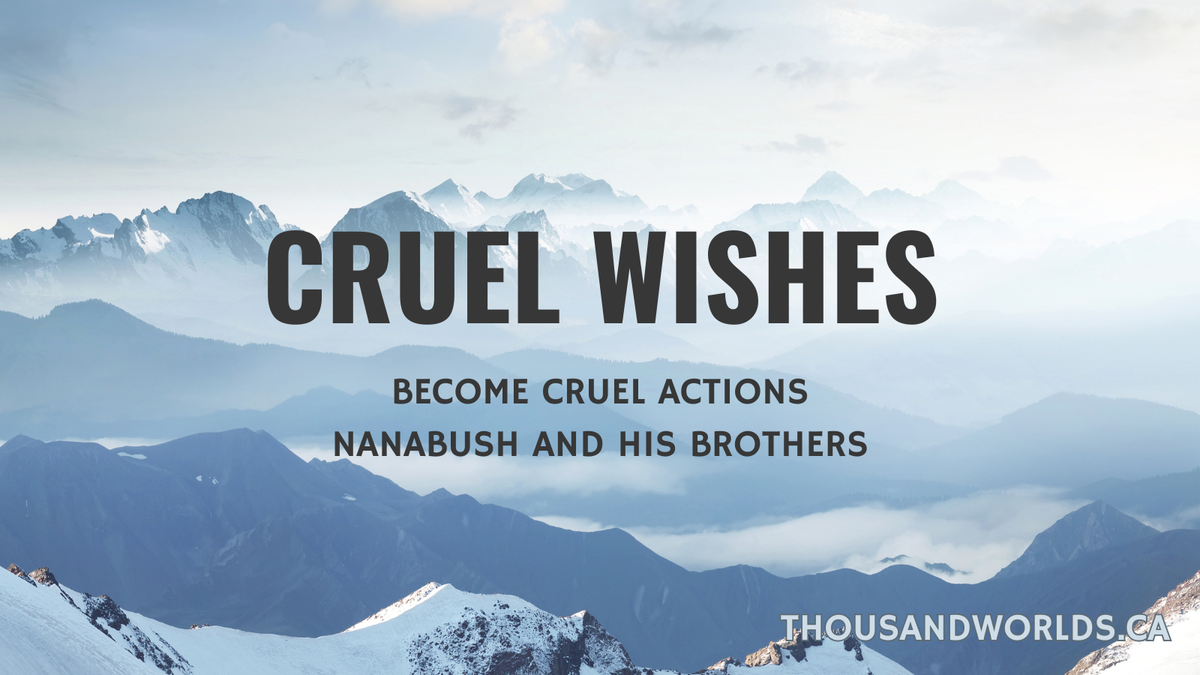
Nanabush and his brothers
To recap:
Nokomis got shoved off the moon by her sisters and fell to earth, landing in a lake where she pouted for a while until a bear convinced her to come up for air. Her medicines remain scattered at the bottom of this lake. They had a daughter, Wenona. She became pregnant by the west wind and died giving birth to four sons, three of whom ran, hopped, or rolled away while Nanabush was raised by Nokomis.
After Nanabush brought back fire, he decided to go look for his brothers.
Jiibayaboos was born half-human and half-rabbit, so he's the one who hopped away. He's the first one that Nanabush sets his mind to killing. It's very Princess Bride. My name is Nanaboozhoo, you killed our mother, prepare to die.
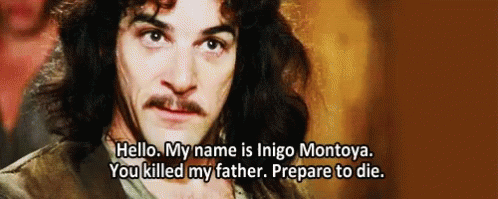
The second story doesn't give us the name of the brother, but in the story about fire told by Isaac Murdoch, which I missed last time because in the title of the story Murdoch emphasizes the relationship with his brother, Nanabush finds Pukawiss when he goes to get fire from a pack of wolves. The lead wolf tells him to reach into this other wolf's mouth and take out the stone, which is flint. It turns out that this other wolf had rolled into camp, a stone with sharp edges, and became a wolf after they adopted him. Nanabush is overjoyed at having found a brother. This is the younger brother that Nanabush travels the world with and who we are going to meet again when we get to the flood story. So it isn't Pukawiss that gets murked by Nanabush, leaving Maudjee-Kawiss by process of elimination.
When Nanabush fights these brothers, it feels inevitable. Ok you found me, lets get this done. They go back and forth and just as it appears that Nanabush will fail, an animal gives him the secret to killing the brother and he does. With both deaths Nanabush is met with "what have you done, your actions have harmed future generations." That's where the stories diverge.
When Jiibayaboos dies he said, this is bad, you have wronged all of those yet to come. Nanabush demurs, no it's ok. We're making things better for them because soon there will be too many humans to live here, so when they reach old age and they die they will go to another world where you will care for them. In Murdoch's version he doesn't say that Nanabush kills Jiibayaboos, but the outcome is the same. Nanabush creates the path known as the Milky Way which those who have died travel to get to the next world. Jibayaboos wanted to be there and so Nanabush sent him to look after that place and the people. Killing would be one way to send somebody to the afterlife.
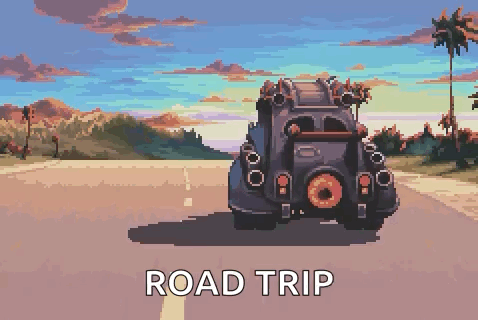
Killing the next brother is more concerning. After he strikes the killing blow Nanabush rushes his fallen brother four times and kicks him. Then he takes the skin from his head, dries it, and puts it on a pole along with his own soiled clout which is, kind of weird. He thinks that kicking his brother will set a precedent for how people ought to behave in conflict and that the pole with its grim flags will make the people happy.
Nokomis is not impressed. She tells him that he has done vast harm upon the living of the future, which is similar to what Jiibayaboos told him, but this time he does not demur, he knows that Nokomis is right. What have I done, he says. And he leaves to travel the earth.
There's a lot going on here and I haven't even told you the half of it.
I've been thinking about these stories for the past few weeks, they're troubling stories and I wasn't sure how I would approach them. Then Chanda Prescod-Weinstein, my favourite astro-physicist, skeeted out this amazing thread on bluesky in the wake of the presidential election about political orientation and people's messed up politics that includes this gem:
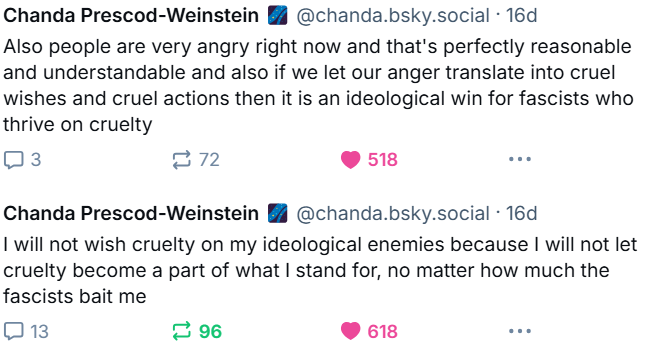
Nanabush's anger was reasonable and understandable, ours often is. As always, it's what we do with our anger that becomes the problem because fascists do indeed thrive on cruelty.
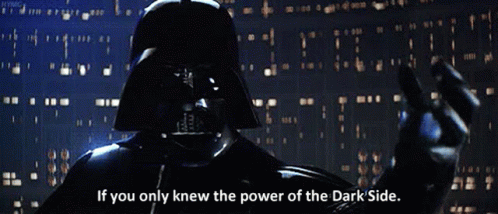
There's something awful about Nanabush's killing of Maudjee-Kawiss that isn't present in the killing of Jiibayaboos. For one thing there is no sense that Maudje-Kawiss gets anything out of it, there is no transformation or cosmic role that must be played. Then there's the added cruelty of kicking with the intention of passing this on to generations of Anishinaabe and that staff he made in the belief it would bring them joy. Now, for all we know Maudjee-kawiss was not a great person. There might be reasons why the animals helped Nanabush kill him, why Nanabush thought evidence of his death might bring joy to the people. But still.
Nokomis' response is unsurprising. What is wrong with you. I raised you better than this. Nanabush accepts this, takes a look at what he's done, and decides to go for a long walk.
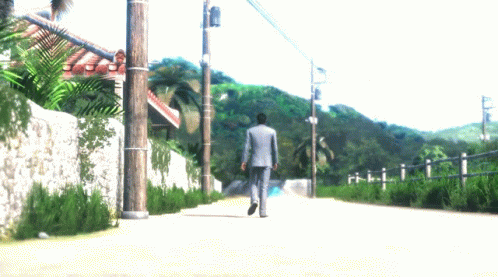
This long walk isn't a banishment or a punishment. He just says, I gotta go. Sometimes that's the right choice. Remember that Nanabush is, relatively speaking, quite young and the stories to this point don't show him engaging much with the world at large although he is definitely aware enough to know that left to ourselves there will eventually be too many of us, he knows we need fire. But for the most part, he's been at home, hanging out with his Nokomis and learning from her but he hasn't had to apply any of that learning to anyone but himself. He hasn't had to see the unintended consquences of his actions, how his choices affect other people. He has been, if you will, in an ivory tower. An insulated echo chamber.
Another key difference between these two stories is that in the killing of Maudjee-kawiss, there is a brief reference to Nanabush forgetting his heart somewhere, that he should have put away his heart. The comment about the heart is interesting because it jives with something I talk about in a blogpost about Franz Fanon and the privilege of non violence, that Anishinaabe and Haudenosaunee people both have teachings on the violence of war and the ceremonies to disconnect our spirit before we take this action, no matter how necessary it may be, in order to protect our core selves.
Nick Fuentes, a white supremacist with a large following on social media, tweeted out in the aftermath of Trump's election "your body my choice." This was likely a shot at abortion activists who use the language of my body my choice, but was quickly taken up as rape apologia by men and boys as young as sixth grade using it to intimidate women and classmates. He was quickly doxxed (his address made public) and he went to his mother's house which was subsequently doxxed and I am in 100% support of this kind of direct action. Then a woman knocked on the door and he maced her. Fuentes was charged with battery and assault, the visual evidence of his mugshot was run up the pole of social media and it did indeed make me smile.
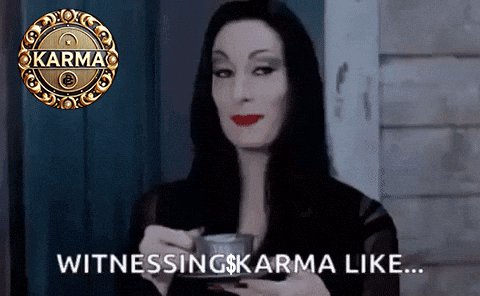
Then the rape jokes started. Mariame Kaba calls prisons rape factories for good reason. There isn't anything funny about posting an image of Fuentes' mugshot with some variant of the caption "your body, cellmate's choice." It may sound like karma coming to collect but the fact is that racially marginalized men and women are the vast majority of the prison population, subject to the daily sexual violence of strip searches in addition to the sexual violence of guards and other prisoners, and the schadenfreude enjoyed from sending one nazi punk to prison won't change that. The brief smile I enjoyed faltered when I remembered that, when I remembered that incarcerating Fuentes won't accomplish anything towards a just world. Carceral solutions are not solutions, and taking pleasure in him being jailed just entrenches what is fundamentally an unjust system.
How do we move forward in our anger without resorting to wishing cruelty on our ideological enemies? Because in case I'm not clear, people whose politics support their own well being at the expense of people made vulnerable by this system are my ideological enemies. I have nothing in common with those who support entrenching an unjust system because it's unjust in their favour and through religion or philosophy they have decided they deserve it. I just don't want to forget where my heart is, even if there may come a time when I have to put it aside to keep it safe. Non violence is, after all, a privilege.
I'm in the midst of reading Disorienting Neoliberalism: Global Justice and the Outer Limit of Freedom by Benjamin L. McKean which I came across in that same thread by Prescod-Weinstein that I mentioned earlier. You knew I was going to mention a book eventually. It's a bit of a tough slog, I'm averaging 15-20 pages per day which is really slow for me, but it's also quite helpful because do any of us know what neoliberalism IS? He offers a helpful definition.
Neoliberalism is an influential political theory that defines freedom as choice in the market and asserts the creation and sustaining of markets as the primary value of politics.
That is super helpful because it offers us a way out of this dystopian nightmare. What if we rejected this definition of freedom? What if we understood that workers and consumers are not our core identities? That we don't "vote with our shopping cart" and that our responsiblity to exploited workers is not to lean into our identity as consumers and refuse to shop in particular ways? All the time, people putting their soiled clout up the pole of social media about how they don't buy this or shop there as if that means anything. It doesn't. [edited to add that this is not a criticism of boycotts organized by workers or others in solidarity like BDS. As always, it is about who is organizing it and what the desired outcome is. Just wanting clean hands is meaningless]
We're all stuck inside this unjust system, and even if it is unjust in our favour sometimes, the simple fact that it reduces our freedom to the marketplace means we really aren't free at all, are we.
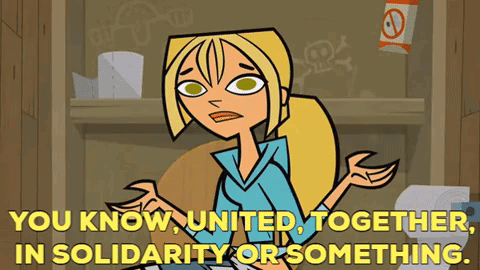
What does all this have to do with Nanabush and his brothers? Maybe I'm really stretching.
I think it's helpful because in these stories we get three ways to relate to those who have, knowingly or not, wronged us and a reminder not to let the cruelty of a neoliberal system become our cruelty. It also reminds us to go for a long walk sometimes and become involved with others outside of our typical circle. To relate to others through our common experience of living beneath an unjust system instead of seeing each other as competition or threats. Returning to Fanon, we get out of the colonial centres and into the places where other ways of living are being imagined and lived.
Pukawiss became a friend, and that's great. Because more often than not the people we are taught to see as threats (foreign workers, immigrants and refugees, queer people) are not threats. They are potential allies with whom we have more in common than we may realize. They may, in fact, hold the key to change just as Pukawiss held the flint and we would do well to remember that our unjust benefit from this system actively blinds us to ways in which we participate in it. Seeing others as allies to whom we are accountable rather than people in need of rescue is a profoundly different orientation.
Jibayaboos was killed, his death having a purpose that continued long after he left his world. It was, if you will, a strategic death. Think of people who are killed by the system, those whose names we are compelled to remember and talk about. Think about those who deliberately put themselves in harms way in order to expose an unjust system, whose deaths reveal the violence of the state. And think about those organizers and movement leaders who strategically provoke state violence, knowing that it may cost some people their lives.
In this I think particularly about Palestine, and the way that 78 years of Israeli violence has been shoved in everyone's faces for the past year prompting a global reaction up to charges in the International Criminal Court and countries withdrawing support from Israel. I also think about Martin Luther King and the way he provoked police violence knowing it would be broadcast on the evening news. Many peaceful protests wind up provoking this kind of violence, but that only works when people are willing to be shamed, to see that this state violence is shameful and unjust. Too many see it as justified and plow their cars into non violent protestors.
Which is why we can't escape the reality that there are people who are legitimate threats to social wellbeing because of the injustices they endorse or enact. Look at the short term aftermath of the CEO shooting. For a little while, at least, health insurance companies were approving medications they would normally disallow. There is certainly something shifting in the zeitgeist that people are broadly unsympathetic to his death and supporting the shooter. The same shift was at work in the insurrection of January 6 when people were mobilized to take action against their own government. And we have to remember that the death of Maudjee-kawiss, however necessary it might have been, was cruel and exploitative. Nanabush had, indeed, lost his heart. He became the thing he had set out to destroy, and more, he offered that to the people as a way to live.
Now, I'm not saying that this is any kind of progression. These stories aren't connected that way. It's not like "try making friends and if that doesn't work then use violence but don't be a jerk about it." Different situations require different solutions. McKean gets at this when he points out that there is a difference between those who experience the oppression of these systems (people working in Bangladesh's garment industry or an Amazon warehouse) and those whose actions further that oppression (supply chain managers or cops). Some can be made friends as we see that our liberation truly is bound up together. We can take steps towards solidarity even while acknowledging that we benefit from this unjust system. Those in that second category, and those who support them, will have decisions to make about their participation in that system. They might be in a position to make substantive changes to policies and practices or their inability to make those changes may reach a level of tension that requires them to leave. That's what happened to me. When I realized that I couldn't make the kind of changes necessary towards a more just child welfare practice, the tension between the person I wanted to be and the person I was made to be made it impossible for me to stay. If they are unwilling to make those changes, well that's what revolutions are for.
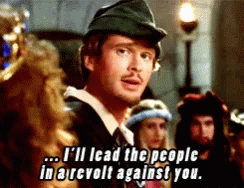
McKean also offers us another definition. The outer limit of freedom.
A key experience of freedom is the recognition that the institutions which have shaped us are ones we would have freely chosen.
He goes on to say that in a well-ordered society, one that we could affirm in this way, we meet our political obligations and express our freedom when we are disposed to reciprocity. It vexes me that he makes no reference to the various Indigenous societies who have this as their foundation. This is, to my understanding, the crux of the Anishinaabe good life. It is the good mind that the Haudenosaunee aspire to. It is what Nanabush's life, despite its many failures, tries to teach us. How to live and organize ourselves in a way that the things that shape our children are things they would have freely chosen. How do we build that world?
We begin by committing not to indulge in cruel wishes and cruel actions against our ideological enemies, even while we acknowledge that their violence requires a response. And we build institutions that are the ones our children would have freely chosen.


And don't forget to join up with the Nii'kinaaganaa Foundation. Every month we collect funds from people living on Indigenous land and redistribute them to Indigenous people and organzers. You can find out more information on the website. Donate via Patreon or PayPal!
